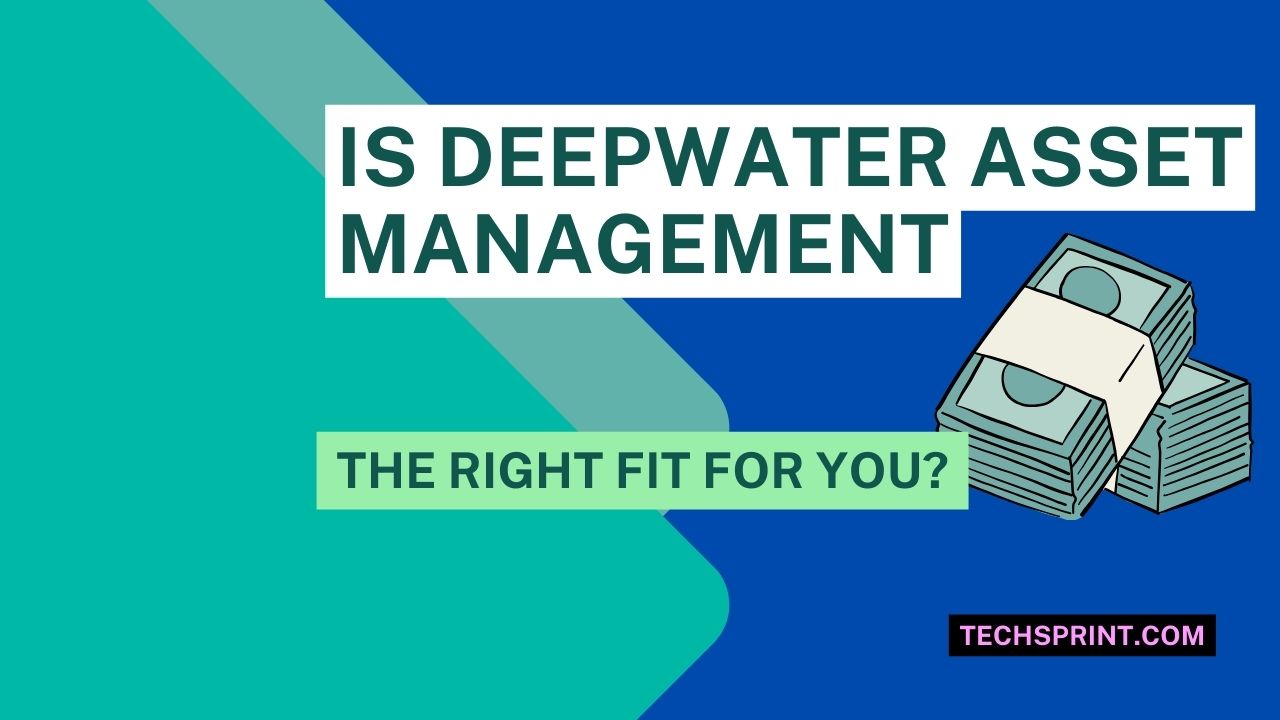Table of Contents
In today’s complex financial landscape, choosing the right asset manager feels like navigating a treacherous ocean. Deepwater Asset Management, with its evocative name, promises a steady hand in guiding your investments. But before you set sail, it’s crucial to determine if Deepwater aligns with your financial goals and risk tolerance.
This article dives deep into Deepwater Asset Management, exploring their investment philosophy, strategies, fees, and suitability for different investor profiles.
Unveiling Deepwater Asset Management’s Depths: Investment Philosophy and Strategies
Deepwater’s core philosophy often remains shrouded in a bit of mystery. Unlike some asset managers who openly tout their approach, Deepwater tends to be more tight-lipped. However, by piecing together information from public sources and industry analysis, we can glean some insights.
Focus on Undervalued Assets: Deepwater seems to favor undervalued assets across various asset classes. This could include stocks of companies with strong fundamentals but currently out of favor with the market, or real estate in emerging markets with high growth potential.
Active Management: Deepwater likely adheres to an active management style. Rather than passively mirroring an index, their team actively researches and selects investments they believe will outperform the market.
Long-Term Perspective: Deepwater might prioritize long-term growth over short-term gains. This could be suitable for investors with a long-term investment horizon, such as retirement planning.
Deepwater’s Investment Strategies: A Glimpse Below the Surface
While specifics remain elusive, here’s a possible breakdown of Deepwater’s strategies:
- Value Investing: Seeking undervalued stocks with strong fundamentals that offer the potential for significant price appreciation.
- Contrarian Investing: Investing in assets that are currently out of favor with the market, betting on a turnaround.
- Thematic Investing: Focusing on specific themes like clean energy or technological disruption, believing these sectors will see substantial growth in the future.
It’s important to note that this is just a general framework. Deepwater might employ a combination of these strategies or utilize others altogether.
The Cost of Deepwater’s Expertise: Understanding Fees

Fees are a crucial consideration when choosing an asset manager. Deepwater likely charges a combination of fees, including:
- Management Fee: A percentage of assets under management (AUM) charged annually. This fee covers the cost of managing your portfolio.
- Performance Fee: A fee levied on any profits generated above a predetermined benchmark. This incentivizes the Deepwater team to outperform the market.
- Transaction Fees: Fees associated with buying and selling securities within your portfolio.
It’s crucial to compare Deepwater’s fees with other asset managers to ensure you’re getting a competitive rate for their services.
Are You a Deepwater Diver? Investor Suitability
Deepwater might be a good fit for you if:
- You have a Long-Term Investment Horizon: If you’re investing for retirement or other long-term goals, Deepwater’s focus on long-term growth could be beneficial.
- You Embrace Market Volatility: Deepwater’s focus on potentially undervalued assets might involve short-term volatility as the market recognizes their true value.
- You Can Stomach Risk: Deepwater’s active management approach could lead to periods of underperformance compared to the market.
However, Deepwater might not be your ideal partner if:
- You Need Short-Term Gains: Deepwater’s long-term focus might not be suitable if you require immediate access to your capital.
- You are Risk-Averse: Deepwater’s strategies might involve a higher degree of risk than passively investing in an index fund.
Beyond the Numbers: Considering Deepwater’s Culture and Transparency
While fees and strategies are important, an asset manager’s culture and transparency also matter. Here are some questions to consider:
- Does Deepwater’s investment philosophy align with your values? Do they prioritize environmental, social, and governance (ESG) factors?
- Does Deepwater communicate clearly and regularly?
- Does Deepwater have a strong track record of performance?
Unfortunately, Deepwater’s relative secrecy can make it difficult to answer these questions definitively.
The Final Dive: Deciding if Deepwater is Your Investment Captain

Deepwater Asset Management offers a potentially compelling option for investors seeking long-term growth through active management. However, their lack of transparency and focus on potentially volatile assets might not suit everyone.
Here’s what to do next:
- Research Deepwater further: Look for any available information on their past performance and investment philosophy.
- Compare Deepwater with other asset managers: Consider factors like fees, investment strategies, and transparency.
- Speak to a financial advisor: Discuss your investment goals and risk tolerance with a professional who can provide personalized advice.
Remember, choosing an asset manager is a significant decision. Take your time, do your research, and don’t hesitate to ask questions. Only then can you confidently decide if Deepwater Asset Management is the right fit to navigate your financial journey through the deep waters of the investment world.
Additional Considerations:
- Minimum Investment: Deepwater might have a minimum investment amount, which could be a barrier for some investors.
- Tax Implications: Understand how Deepwater’s investment strategies might impact your tax situation.
Remember: Past performance is not necessarily indicative of future results.
Taking the Plunge with Deepwater:
If, after careful consideration, you decide Deepwater aligns with your investment goals, here are some steps to take:
- Schedule a consultation: Discuss your portfolio and investment objectives with a Deepwater representative.
- Review the Investment Management Agreement (IMA): Carefully read and understand the terms and conditions before signing any agreement.
- Fund your account: Once you’ve decided to proceed, you’ll need to transfer your investment funds to Deepwater.
Conclusion:
Deepwater Asset Management presents a unique proposition for investors seeking active management with a focus on potentially undervalued assets. However, their lack of transparency and potentially higher risk profile require careful consideration. By thoroughly researching Deepwater, comparing them with other options, and consulting with a financial advisor, you can make an informed decision about whether Deepwater can be your trusted captain on your investment voyage.
Remember, the key to successful investing is understanding your risk tolerance and aligning your investments with your long-term goals. Deepwater might be a great fit, but only you can decide if they are the right partner for navigating your financial future.

